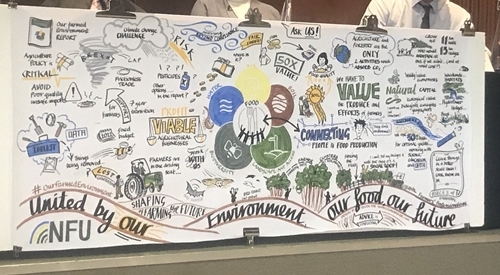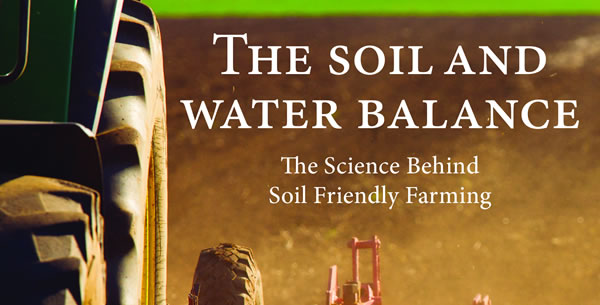13/12/2018
10 Highlights from the NFU's Farmed Environment Conference
With the first NFU Farmed Environment Conference taking place in Westminster yesterday, The Allerton Project’s Head of Farming, Phil Jarvis, offers his top ten highlights from the day’s proceedings.
“My feelings, as I entered the RICS building within the view of the Houses of Parliament, were those of dismay. I felt like the house was on fire and we were attending to the flowers in the garden and the vegetables in the allotment!!!

- The fact that the NFU brought this conference into the middle of London to highlight the importance of the farmed environment and linking it to food production is to be commended. The report launched at this conference ’United by our environment, our food, our future’ is an opening gambit, some opening remarks for a wider conversation. The NFU will be continuing this debate will all of us for many years to come.
- Minette Batters opened and closed the conference emphasising that we need profitable businesses to deliver the public goods, society require, demand and expect. There were some clear messages about future investment in the countryside and looming trade deals. If poorly executed (and quite frankly the appalling events unfolding in Parliament don’t fill you with much confidence) we will miss the opportunity for change or export environmental issues to other parts of the planet. The NFU President stressed that farmers shouldn’t be complacent and there was still more work to do. Indeed, the Farmed Environment Report, whilst delivering a positive message about what farmers are already doing has over 40 references to where improvement can be made. I suggest some commentators who took to social media to express some negative views, read the document and look at how we take the common ground forward. It will be a much more constructive area in which to debate our differences. Working without farmers or introducing complex regulation to solve these conundrum’s is going to be a difficult circle to square.
- George Eustice, deputising for Michel Gove, gave some succinct comments on the Agricultural Bill and the future Environmental Land Management schemes. The questions were wide ranging, could such schemes ‘Bridge the Risk’ of new agricultural production systems? Can we really deliver meaningful agroecological approaches/Integrated Pest Management/Organic Fusion/Improved farming husbandry (Delete as required to leave your preferred phrase). After a long and winding question, the Minister expressed that this showed what was wrong with the CAP. Some might think the UK’s delivery of CAP might have to share some partial blame. The future, if the UK has one, will see our destiny in our own governments hands. No penalties or fines from Europe just the checks and balances from the Treasury then…brace yourselves!!!
- The morning panel of ’Movers and Shakers’ included Richard Bramley from the NFU Environment Forum, Chris Musgrave from Marlborough Downs NIA, Judith Batchelar from Sainsburys, Shaun Spiers from the Green Alliance and Teresa Dent from Game and Wildlife Conservation Trust. My summary won’t do them justice ….but I think they said value food, value community, value the customer, value other people’s view and value working together in the landscape. These can help our roadmap to a better environmental future. The afternoon panel of ‘Food and Soil Makers’ (the case study farmers in the report) explained their environmental ethos. My favourite, Thomas Binns, clear concise and straight to the point.
- The questions from the floor. A grown-up discussion on reduced pesticide use, integrated pest management, farmers who weren’t so committed to the environment and water quality. Should we value food and biodiversity in equal measure, no ranting and raving (well only a little) but some well measured responses.
- The tangibles came in the form of the NFU’s commitment and sponsorship of the GWCT’s Big Farmland Bird Count. It’s coming up in February 2019 and it’s time for farmers to take this to another level.
- I always like a bit of humour and Mike Green from BASF question to George Eustice about how he was getting on with his price list for Natural Capital got the chuckling muscles going. However, Minette Batters comments on ‘how much she enjoyed Paol Hoveson big kit!!!’ certainly lightened the mood in the room.
- We only lightly touched on regulation, verification, complexity of delivering workable future environmental schemes. There are threads throughout the report and speakers eluded to well researched but practical solutions, for practical people, to solve practical problems. At the risk of shooting myself in the foot with this article, I saw a very poignant cartoon this morning that said, ‘There are a lot of people writing, but not many reading’!!! Food for thought, but it brings me nicely to my concluding point.
- Our next generation…. Whether it be for the next generation of farmers or youngsters in our education system, it was great to hear the work the NFU is doing in this area. We must stop talking about the balance of food production and environmental responsibilities and get on with delivering more tangible benefits for those who will live with the results of our actions, with farmers in the driving seat. The bookends in this debate are the 25 Year Environment Plan and a ‘productive, profitable food sector’. There need to be some win wins for all those interested in our rural landscape. We just need to work out how the market place, farmers improving efficiency and some effective government policy deliver those win wins.
- The real summary of this conference can be seen on this extraordinary piece of artwork, which I thought had been put together before the conference. Little did I know the artist was in residence during proceedings. Bravo!!


Get the inside track on soil and water research
Priced now at just £4.95 (50% off), The Soil & Water Balance is a handy paperback which provides the inside track on soil and water research.
Presented in a Q&A style, much like our popular Moorland Balance, this 100-page book looks at the problems and solutions on topics ranging from erosion and contamination, to the impact on songbirds and other wildlife.
Combining years of research at the GWCT's Allerton Project demonstration farm with tens of external scientific papers, this is a fascinating study of how farming can adapt to the challenges it currently faces.
View Book >
or
Buy Now - £4.95 >
100% Secure. All Credit & Debit cards, PayPal, Apple Pay and Google Pay accepted.
